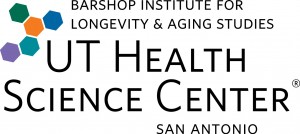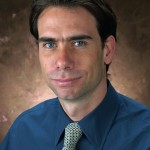 New director says a top priority is translation of discoveries to patient care
New director says a top priority is translation of discoveries to patient care
 Nicolas Musi, M.D., a physician-scientist in the School of Medicine at The University of Texas Health Science Center at San Antonio, became director of the Health Science Center’s world-recognized Barshop Institute for Longevity and Aging Studies, effective Sept. 1.
Nicolas Musi, M.D., a physician-scientist in the School of Medicine at The University of Texas Health Science Center at San Antonio, became director of the Health Science Center’s world-recognized Barshop Institute for Longevity and Aging Studies, effective Sept. 1.
Dr. Musi, professor of medicine and a faculty physician with UT Medicine San Antonio, joined the Health Science Center in 2003. He occupies the Sam and Ann Barshop Endowed Chair in Translational Research and directs the Center for Healthy Aging within the Barshop Institute, and is director of the Geriatric Research, Education and Clinical Center within the South Texas Veterans Health Care System. Fellowship-trained in endocrinology and metabolism at the Joslin Diabetes Center of Harvard Medical School, Dr. Musi sees diabetes patients on a weekly basis while conducting translational research that focuses on aging and metabolism and the cellular and molecular effects of exercise.
“I want to make sure that the Barshop Institute maintains and even enhances its stature as one of the leading institutes in the basic biology of aging,” Dr. Musi said. “As we do this, we will have a more comprehensive program that will include a strong translational component to move the research conducted at the lab bench and apply it at the bedside.”
David Weiss, Ph.D., vice president for research at the Health Science Center, stated: “Dr. Musi has an exceedingly well-funded research program. Although his emphasis is on research, he also provides patient care and is an attending physician at the South Texas Veterans Health Care System and University Hospital. Dr. Musi has the credentials, experience, vision and demeanor to not just maintain, but advance, the already stellar reputation of the Barshop Institute.”
Dr. Musi is succeeding Arlan G. Richardson, Ph.D., the founding director of the Barshop Institute. The institute, established in 2001 to coalesce the many investigators studying aspects of aging and age-related diseases at the Health Science Center, perennially is among the leaders in National Institute on Aging grants in the basic biology of aging. The institute is also riding the crest of a wave of good news.
William L. Henrich, M.D., MACP, president of the Health Science Center, recently announced the Texas Legislature’s approval of $4 million in exceptional-item funding over the 2014-2015 biennium to establish a Translational Aging Research Program within the Barshop Institute. This program will focus its efforts on developing the strategies, personnel, infrastructure and study populations to evaluate whether interventions targeting the fundamental processes of aging can delay the onset of chronic diseases and disabilities in humans.
The National Institute on Aging in July announced a $3.4 million training grant to the Barshop Institute. The five-year grant will enable 10 graduate students and six postdoctoral fellows to pursue novel research on the basic biology of aging. It is the largest training grant of its kind in the biology of aging in the country.
Existing programs will continue, Dr. Musi noted, including the Comparative Biology of Aging Program, which uses species’ differences in aging rate as an investigative tool to try to understand what mechanisms govern the rate of aging; the San Antonio Nathan Shock Center of Excellence in the Basic Biology of Aging, which serves as a core resource for scientists; and the Interventions Testing Program, which evaluates treatment strategies such as the drug rapamycin that are likely to prevent or delay adverse age-dependent changes in cells and tissues and to diminish the burden of disease in old age. Each of these programs is funded by the NIA and other sources.
The Center for Healthy Aging, which continues under Dr. Musi’s leadership, is progressing toward becoming a center of excellence for integrated, interdisciplinary geriatric care, translational and clinical research, and geriatrics and gerontology education.
All endeavors add up to the overall goal: making lives better.
“The individuals working at the Barshop Institute will be dedicated to realizing the vision of a world where people live long and enjoyable lives,” Dr. Musi said.
Dr. Musi received his M.D. degree with honors from Universidad Anahuac in Mexico City in 1995. He then completed an internship and residency in internal medicine at the University of Miami.
For current news from the UT Health Science Center San Antonio, please visit our news release website, like us on Facebook or follow us on Twitter.
The University of Texas Health Science Center at San Antonio, one of the country’s leading health sciences universities, ranks in the top 3 percent of all institutions worldwide receiving National Institutes of Health funding. The university’s schools of medicine, nursing, dentistry, health professions and graduate biomedical sciences have produced more than 29,000 graduates. The $762.2 million operating budget supports eight campuses in San Antonio, Laredo, Harlingen and Edinburg. For more information on the many ways “We make lives better®,” visit www.uthscsa.edu.
